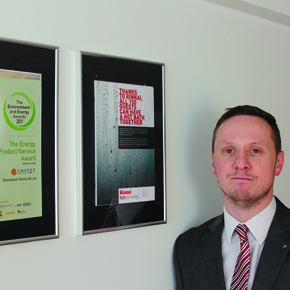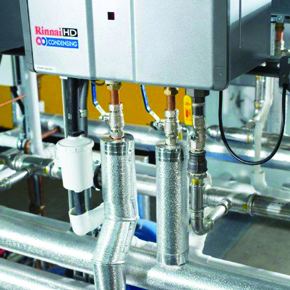
Heating & ventilation: Intelligence by design
Chris Goggin, associate director at continuous flow water heating product manufacturer, Rinnai, looks at how intelligence by design future-proofs product and installations against rising energy prices and any forthcoming legislation…
Energy efficient continuous flow condensing gas fired water heaters offer a tankless form of hot water delivery that can have huge ongoing financial benefits to building owners and tenants. This is even before the advanced energy saving technologies of the units themselves are taken into account.
Manufacturers know that major investment in the latest energy saving technologies for their products is the only way to ensure energy efficiencies that future-proof against rising fuel prices and any new legislation coming up.
Technologically advanced and renewables-ready heavy-duty condensing continuous flow units are now on the market that guarantee the highest efficiencies and, therefore, the lowest running costs of any commercial water heater.
One current model has shown an impressive energy performance of 107% net efficiency while another has turned in 105% net efficiency in tests.
For large commercial operations, a recently-launched premium condensing continuous flow water heater is pushing boundaries, having been tested to below 20ppm NOx, producing the lowest emissions on the market, with 107% gross efficiencies.
This unit is a prime example of intelligence by design. The renewables-ready low NOx series is the first heater of its kind to utilize this patented pre-mix burner technology. The newly developed down-firing burner allows increased efficiency and reduces NOx gases. It has a 13-1 turn down ratio – the largest on the market – of 58.4-4.5kW and is ultra quiet in operation – so quiet that you wouldn’t know it was on unless you glance at the number on the display.
By taking a longer view, far beyond the parameters of the product itself, looking at the environments in which they are put to work, these advanced units meld technology with practicality to ensure the best possible performance in operation.
Heating and hot water account for more than one third of UK business energy consumption, so having firm control over this area via BMS gateway technology can really help to reduce energy bills and achieve all-important CSR environmental requirements on carbon reduction.
And as we continue to look for greener solutions, it is reassuring to know that the hot water produced by one of these clever condensing continuous flow water heaters can also be utilised as a secondary heat source for a solar or ASHP-boosted hot water delivery system. This is unequivocally one of the most energy efficient of all methods available today.
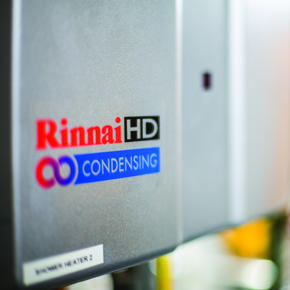
A gas fired condensing unit, used as a gas booster for solar systems, maximises solar gain, as it only consumes energy when the renewables gain cannot achieve the desired temperature.
A gas fired condensing unit, used as a gas booster for solar systems, maximises solar gain, as it only consumes energy when the renewables gain cannot achieve the desired temperature. The rest of the time the unit is inactive. It is also the only booster that ensures never-ending hot water – no matter the demand, so people can shower or bath any time of the day or night. Energy is only used when the renewable thermal energy store is below its set-point, thus reducing the dependency on fossil fuel and reducing CO2 emission.
The appliance will maximize performance and minimize energy input at this point, as it will only apply the precise amount of energy to boost the temperature, taking full advantage of the turn down ratio discussed earlier.
By utlising products that incorporate energy saving technology and have access to building management systems – and which have the capacity to boost renewables performance – all means that end users are now in a position to really take advantage of all the benefits of intelligence by design.
Not only will building owners be able to slash running costs and reduce carbon related to hot water services, they will easily meet – and surpass – the demands of CSR requirements and current and future legislation.
Find out more in the March issue of ABC+D Magazine
Latest news
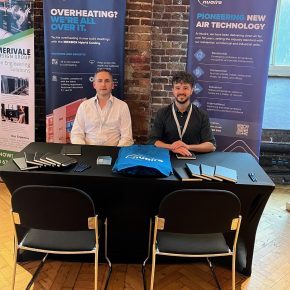
17th April 2025
Nuaire shares expertise at Specifi Mechanical Services events in 2025
Indoor air quality and ventilation manufacturing specialist Nuaire is pleased to be exhibiting at the Specifi Mechanical Services events once again in 2025.
Posted in Air Conditioning, Articles, Building Industry Events, Building Industry News, Building Products & Structures, Building Services, Exhibitions and Conferences, Facility Management & Building Services, Heating, Ventilation and Air Conditioning - HVAC, Restoration & Refurbishment, Retrofit & Renovation
15th April 2025
West Fraser: CaberDek earns top marks from Home Counties carpentry specialist
A specialist carpentry sub-contractor covering housing sites across a large swathe of the Home Counties has come to value CaberDek from the West Fraser range for a variety of reasons: not least because the high quality panel product doesn’t destroy his operatives’ electric saws!
Posted in Articles, Building Industry News, Building Products & Structures, Building Systems, Case Studies, Restoration & Refurbishment, Retrofit & Renovation, Roofs, Timber Buildings and Timber Products, Wooden products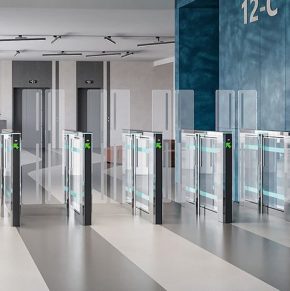
15th April 2025
GEZE: The Role of Access Control Systems in Enhancing Building Safety
Jane Elvins, Specification and Business Development Manager at GEZE UK, delves into the role of access control systems in enhancing building safety…
Posted in Access Control & Door Entry Systems, Architectural Ironmongery, Articles, Building Industry News, Building Products & Structures, Building Services, Doors, Facility Management & Building Services, Health & Safety, Restoration & Refurbishment, Retrofit & Renovation, Security and Fire Protection
11th April 2025
Don’t Do a Dave! It’s Time to Lock FIT Show 2025 in Your Calendar!
It’s that time again – FIT Show is back! You could be forgiven for thinking there won’t be much new to see when FIT Show returns to the NEC from 29 April – 1 May. Wrong!
Posted in Articles, Building Industry Events, Building Industry News, Building Products & Structures, Building Services, Continuing Professional Development (CPD's), Exhibitions and Conferences, Information Technology, Innovations & New Products, Restoration & Refurbishment, Retrofit & Renovation, Seminars, Training
 Sign up:
Sign up: 